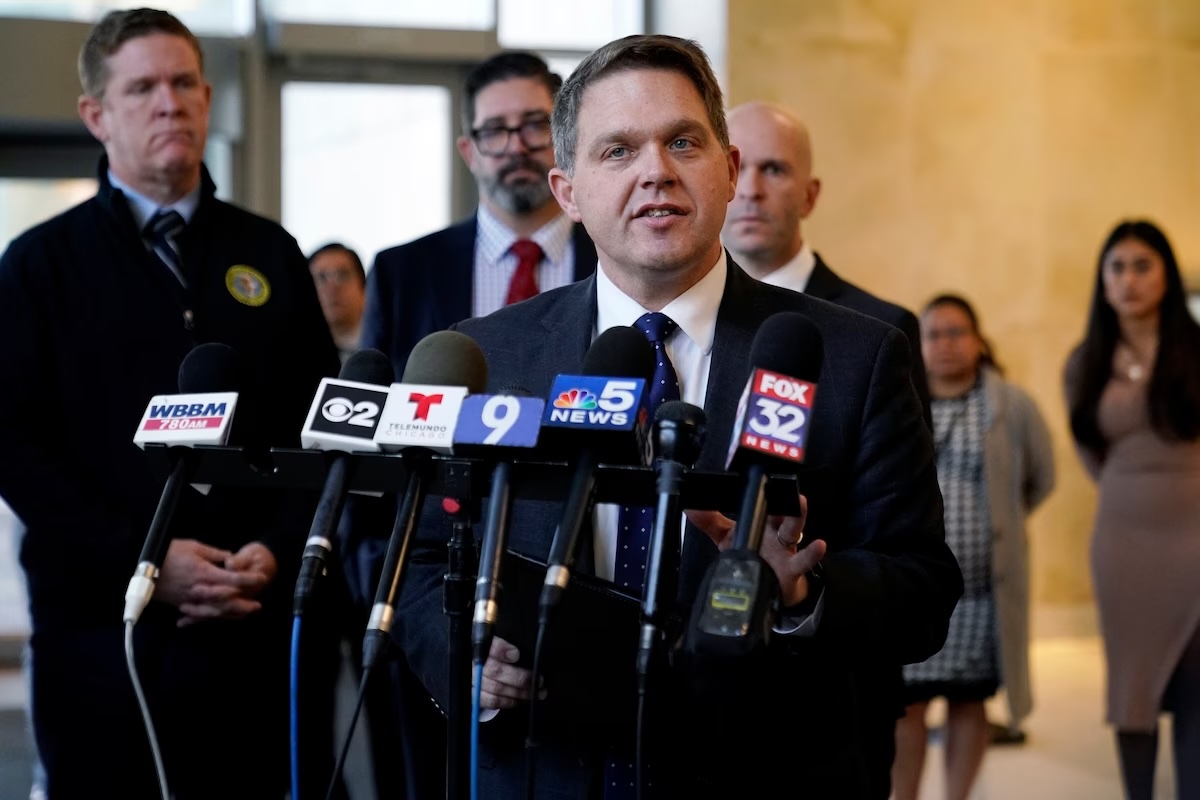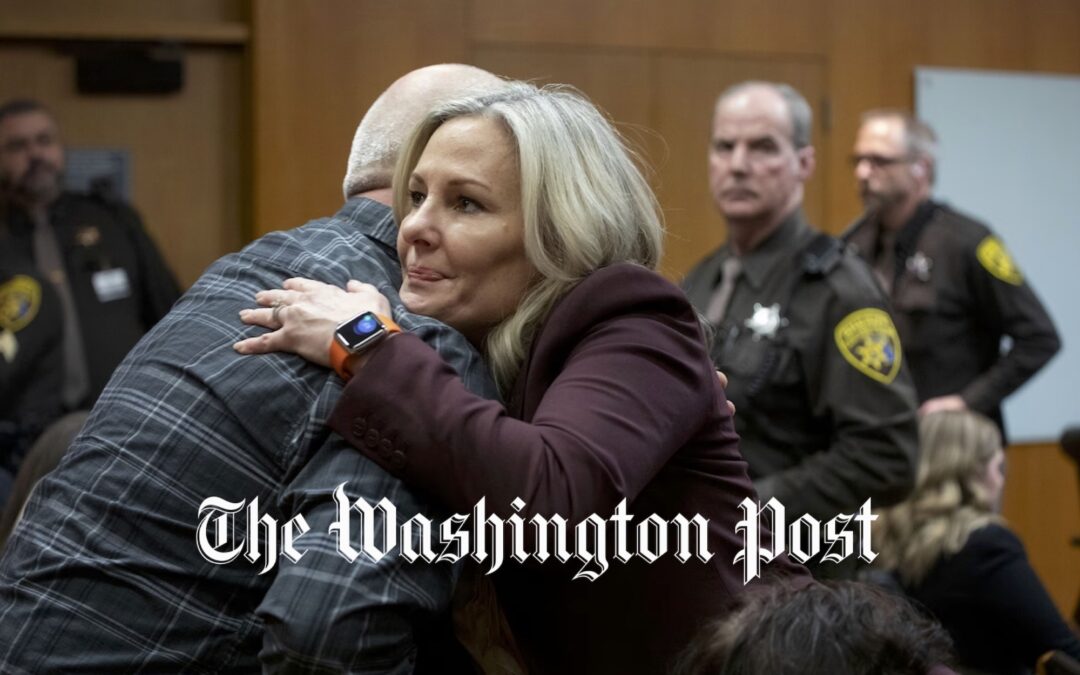IMAGE: Oakland County Prosecutor Karen McDonald hugs Craig Shilling, the father of Justin Shilling, one of the four students who was killed by mass shooter Ethan Crumbley. A jury found Jennifer Crumbley, Ethan Crumbley’s mother, guilty on four counts of involuntary manslaughter on Feb. 6 at Oakland County Circuit Court in Pontiac, Mich. (Bill Pugliano/Getty Images)
Washington Post | By Kim Bellware
Updated February 8, 2024 at 2:31 p.m. EST|Published February 8, 2024 at 12:56 p.m. EST
After a Michigan jury convicted Jennifer Crumbley of involuntary manslaughter in a historic case that looked at the culpability of a school shooter’s parents, Craig Shilling made a prediction.
“I feel like this verdict is going to echo through every household in the country,” said Shilling, whose son, Justin, was among the four students killed by Jennifer Crumbley’s son at Oxford High School in 2021.
Crumbley’s historic conviction shows that jurors are willing to determine that people beyond just the shooter should be held responsible when a child picks up a gun. Shilling and others hailed the verdict as a win for accountability. But they also nurse a hope that the verdict’s true effect is deterring other mass shootings.
Legal experts and gun-safety advocates say the United States — where 394 school shootings have occurred since the Columbine High School massacre in 1999 — cannot prosecute its way out of its gun-violence crisis. Still, many see the Crumbley verdict as a watershed moment that could prompt gun owners with children living at home to take the kinds of precautions that jurors found Jennifer Crumbley neglected: detecting warning signs of her son’s future violence and safely storing a gun in the home.
Nick Suplina, the senior vice president for law and policy at Everytown for Gun Safety, an anti-gun-violence nonprofit, said the Crumbley verdict will “absolutely” help to prevent future shootings by sending a clear message to gun owners that the decisions they make in their homes could have profound effects across their communities.
“The implications are bigger than the context of just this case, but the takeaway is streamlined: Lock up your guns, and you can avoid a whole host of issues that lead guns to being the leading killer of kids and teens in the country,” Suplina said.
Crumbley is the first parent of a school shooter to face homicide-level charges related to the murders her child committed — Ethan Crumbley pleaded guilty in 2022 to two dozen charges, including first-degree murder and terrorism. He was sentenced to life in prison without parole in December.

IMAGE: Lake County, Ill., State’s Attorney Eric Rinehart talks to reporters on Nov. 6, 2023, after Robert Crimo Jr. pleaded guilty in a case that centered on how his son, Robert E. Crimo III, obtained a gun license. (Nam Y. Huh/AP)
Eric Rinehart, a prosecutor in Illinois, said that while the deterrent effect from Jennifer Crumbley’s conviction won’t be felt overnight and it won’t encompass every parent, it’s nonetheless meaningful.
As the Lake County state’s attorney, Rinehart last year secured a reckless-conduct guilty plea from Robert Crimo Jr., the father of the young man who killed seven people in the 2022 Highland Park shooting, putting him among a handful of prosecutors to recently pursue novel charges against the parents of a shooter.
Convictions such as Crumbley’s and Crimo’s will potentially deter gun-owning parents from being lackadaisical with gun safety and storage, Rinehart said.
He draws a parallel with the way DUI arrests may have little effect on a habitual drunk driver but serve as a powerful deterrent for casual drinkers who may momentarily consider rolling the dice by getting behind the wheel after a night out.
“There are lots of theories of deterrence, and different people think differently about their future, their careers, their responsibilities,” Rinehart said.
Deterrence won’t be achieved by prosecutions alone, but Crumbley’s conviction can serve to “galvanize” a community to take further action, said Mark Chutkow, a Michigan defense attorney and former federal prosecutor. He shared in Rinehart’s DUI analogy, noting that drunken-driving deterrence didn’t just come from prosecutions.
“There were groups like Mothers Against Drunk Driving and their marketing campaigns that changed peoples views on [DUIs] in a way that mere prosecutions didn’t,” Chutkow said.
When Oakland County Prosecutor Karen McDonald brought charges against the Crumbley parents in 2021, she said the prosecutions were meant to send a message to gun owners that they had a responsibility to make their weapons inaccessible to children — and that there would be serious consequences if they ignored that duty.
“A prosecutor is trying [Crumbley’s] case because no one else was coming to the rescue; in our lifetime, Michigan had not passed serious gun reform,” said Ekow Yankah, a University of Michigan law professor.
After the Oxford shooting, Michigan lawmakers passed at least four gun-safety laws, including one requiring universal background checks for gun buyers; a “red flag” law that would remove guns from the homes of people who are a risk to themselves or others; and a safe-storage law for guns in homes where minors reside or are likely to be present.
Yankah said the new laws were “unquestionably” brought in response to the Oxford shooting and last year’s mass shooting at Michigan State University. Passing the laws became politically feasible after the 2022 election, when, for the first time in 40 years, state Democrats controlled both legislative chambers and the governorship.
The Michigan laws take effect next week.
Yankah and others warned that Crumbley’s successful prosecution may have the unintended consequence of being used as a cudgel against parents who were not as obviously negligent yet feel pressured to accept a plea deal. That could lead some parents, particularly those from “politically vulnerable” groups, to spend years behind bars, for instance accepting a five-year plea deal to avoid the risk of a 15-year sentence if convicted at trial, Yankah said. Plea deals, he noted, receive far less scrutiny than a trial.
“Some cases live in infamy as rare and unique, but they stand there for other prosecutors to use as an argument,” he said.

